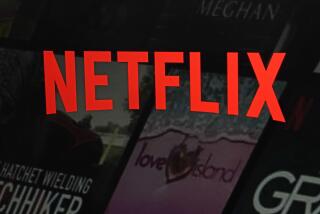‘I want my BBC’: Agree?
- Share via
NEW YORK — When it comes to reach, few news organizations rival that of the BBC, the venerable British broadcasting service recognized around the world for its no-nonsense newscasts delivered in crisp, clipped tones.
BBC World, the BBC’s commercially funded, 24-hour television news channel, now attracts 76 million viewers a week from more than 200 countries, making it one of the biggest international news networks.
But 16 years after its launch, the channel is largely absent from one major market: the United States. Just about 2.5 million homes have access to the network: either through Cablevision in New York or the new Verizon FiOS service, available in fewer than a dozen states. (PBS and BBC America also run 30-minute BBC World newscasts.)
“North America is the only region of the world where BBC World isn’t available on a 24-hour basis” in most places, said Richard Sambrook, the network’s chief executive. “We’ve had a number of discussions and negotiations over the years, but in a sense, we took the easier route: We got the rest of the world sorted out and then came to North America.”
BBC World executives are now hoping to make inroads in the U.S. through a campaign aimed at prodding viewers to demand that their cable and satellite providers distribute the network.
The thrust of their message: that American networks are failing to satisfy the audience’s appetite for foreign news.
“We’ve had a wealth of research, which clearly demonstrates there is a real thirst for unbiased international news,” said Annabel Cameron, head of marketing for BBC World. “A lot of the feedback we’ve been getting is that people are very much seeking depth of analysis and impartiality in terms of the coverage and they feel they aren’t getting that from their U.S. news providers.”
To bolster its argument, the network notes that nearly two-thirds of the 19 million people who visit BBCNews.com every month are based in the U.S., according to internal research statistics.
Los Angeles is one of the main targets of BBC World’s marketing campaign, which is employing novel tactics to capture the public’s attention. Beginning today, Angelenos will find more than 200 oversized puzzle pieces in the shape of countries like Iran, China and Sudan propped up in high-traffic areas around the city.
Emblazoned on each is the message: “See the world you’ve been missing. For unbiased global news, demandbbc.com.”
The same tagline is affixed to the wall of a building in downtown L.A., along with a provocative mural that depicts a recent riot in Russia, formed out of television cable. And similar missives will be found on country-shaped magnets left in coffeehouses and other locations with WiFi access to drive viewers to the Demand BBC website. Once online, they can submit their names and their cable or satellite providers.
Through the campaign, being launched simultaneously in San Diego and Columbus, Ohio, “we really hope we’ll be delivering thousands of votes we can take to our cable operators to showcase real demand,” Cameron said.
It remains to be seen whether the network’s tactics will succeed in persuading the cable and satellite systems to add yet another channel to their crowded menus. Representatives of Comcast and Charter Communications would say only that they have had preliminary discussions with BBC World. Maureen Huff, a spokeswoman for Time Warner Cable, declined to comment on any negotiations, adding: “We’re always interested in hearing from our customers, but these expensive programmer-run campaigns are generally not that effective.”
BBC executives said they’re under no illusions that getting carriage in the U.S. will easy.
“Largely because the cable systems are mature, this is a very difficult market to break into it,” Sambrook said. “But it’s an important one, both editorially and commercially.”
In making its case, BBC World is stressing the network’s reputation for impartiality.
“BBC’s brand is objective news, based on fact,” Sambrook said. “It’s part of our editorial culture.”
The network is hoping that will help it appeal to U.S. viewers discontented with American news outlets. To spotlight the dissatisfaction, BBC World released a national survey of American adults in late June by pollster Frank Luntz that found that 47% rate current coverage of international news as fair or poor. Almost two-thirds of cable subscribers said they would be interested in a 24-hour BBC channel. (Rival networks declined to comment on the poll’s findings.)
The survey contradicts the “conventional wisdom in U.S. news organizations that Americans aren’t so interested in the world,” said Rome Hartman, a former CBS News producer who recently joined the BBC.
“I think that’s less and less true,” Hartman said. “It is by any measure a niche audience at the moment, but I think it’s a growing niche.”
Hartman, who until recently served as executive producer of “CBS Evening News With Katie Couric,” is developing a one-hour evening newscast aimed at U.S. audiences that will run on both BBC America and BBC World, set to debut this fall. He said he envisions the program as a complement to the American network news programs.
“I can see people really hungry for news watching both,” he said. “I think the American networks on their evening news do a good job. I think we did a great job. But this is going to give you a much more nutritious meal, night in and night out, of world events and trends than the American networks are able to provide.”
The veteran producer said he doesn’t fault his former employer or the other networks for not providing more foreign coverage.
“All the American networks have very capable, dedicated and experienced correspondents and producers overseas,” Hartman said. “But if you look at the reach and the resources of the BBC as compared to the American networks, there’s just no comparison.”
More to Read
The biggest entertainment stories
Get our big stories about Hollywood, film, television, music, arts, culture and more right in your inbox as soon as they publish.
You may occasionally receive promotional content from the Los Angeles Times.










